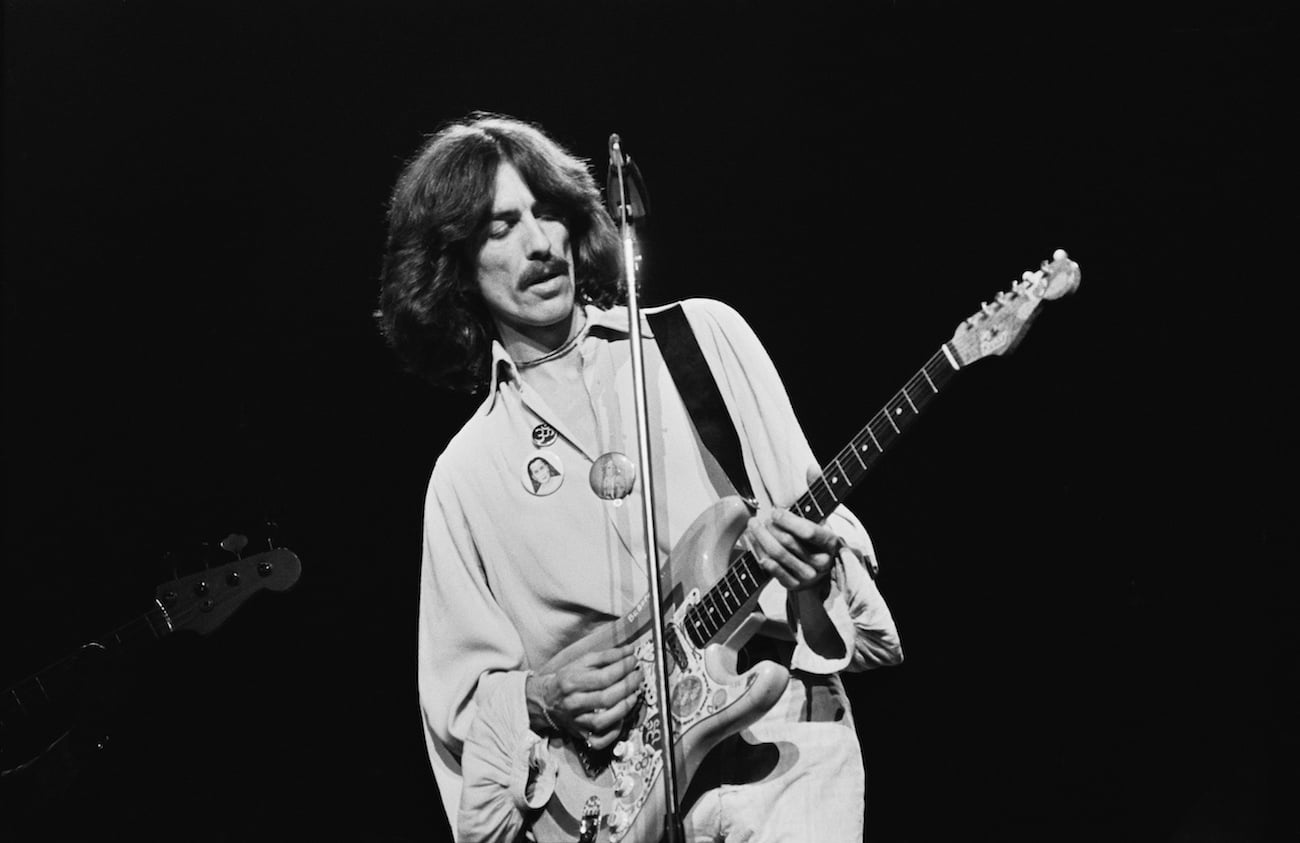
George Harrison Felt Performing Beatles Tunes During His 1974 Dark Horse Tour Would Be Hypocritical
George Harrison felt it would be hypocritical if he performed his Beatles hits during his 1974 Dark Horse tour. He didn’t initially add songs like “Here Comes The Sun” and “While My Guitar Gently Weeps” to the setlist. However, his musical guru, Ravi Shankar, convinced him to add them due to fans’ agitation.

George Harrison alienated his audience during his Dark Horse tour
A rejuvenating trip to India spurred George into action in early 1974. He hadn’t been on the road since 1966 with The Beatles. However, he suddenly felt like doing a tour and an album.
“He was definitely inspired after Bangladesh,” said Billy Preston in Here Comes The Sun: The Spiritual And Musical Journey Of George Harrison by Joshua M. Greene. “He wanted to [perform live] again, right away.”
However, George might’ve worked too fast because Dark Horse sounded rushed to fans and the press. He didn’t help matters by over-working his vocal cords on various projects.
During a press conference before the tour that was doomed to fail from the start, George said, “I realize that the Beatles did fill a space in the sixties. All the people that the Beatles meant something to have grown up and want to hold on to something. People are afraid of change, but you can’t live in the past.”
When George started his Dark Horse tour, he realized it was completely different than touring with The Beatles. He had laryngitis, but George also chose to start each show with a lengthy performance from Shankar and Indian musicians. Greene wrote that it left fans “yawning and restless.”
When George came on, he constantly urged the crowd to shout, “Chant Krishna! Christ! Krishna! Christ! Allah! Buddha!” Greene wrote, “He came across as overzealous, alienating much of his audience.”
George didn’t want to play Beatles songs during his Dark Horse tour
George further alienated his audiences on his Dark Horse tour by not playing Beatles songs.
“People had come expecting at least a few Beatles memories, but George refused to be pulled back into that persona, providing concertgoers instead, with what one reporter called ‘a surfeit of the unfamiliar and a short-changing of the golden greats,'” Greene wrote.
Eventually, Shankar had to step in and be the voice of reason. Greene wrote, “Ravi appealed to him. ‘Give the people a couple of old songs,’ he said. ‘It’s okay.'”
“It was not waving a picture of Krishna over his head that fans minded,” Greene continued. “They could even go along with his insisting that God was where it was at and his yelling, ‘Someone’s got to tell you!’ After all, those were his beliefs, and so long as the music rocked, they felt they were getting their money’s worth.”
Eventually, George started playing Beatles songs, but he made matters worse when he changed the lyrics to reflect his spirituality. “Now his guitar ‘gently smiled,’ and in his life he ‘loved God more,'” Greene wrote. “No one in the audience shouted what they were feeling, but the sense of betrayal was obvious beneath their indifferent applause.
“Beatles songs had made them feel good. They remembered where they were the first time they heard each new Beatles song, what they were doing, and who was with them. Those memories were important to them, and playing fast and loose with Beatles lyrics came across as elitist, and worse, hurtful.”
“I don’t know how it feels down there,” George said at the Forum in Los Angeles, “but from up here you seem pretty dead.”
After performing at California’s Long Beach Arena, George walked through the stands, wondering what he was doing wrong. He didn’t care if people liked him as long as he remained true to himself. Greene wrote, “He remembered a quote from Mahatma Gandhi: we should create and preserve the image of our choice. The image of my choice is not Beatle George, he thought. My life belongs to God. That’s how I feel.
“He was here in the world to do spiritual good, and playing the old hits would have felt hypocritical. How could he live with himself if he reinforced people’s material attachment to nostalgic tunes and images? But was this better—bad reviews and mountains of trash?”
Whether George wanted to sing Beatles songs or not, nothing sounded good
Whether George wanted to sing his Beatles songs during his Dark Horse tour, his voice wasn’t up to the task.
“From city to city, his voice continued to waver and crack,” Greene wrote, “In Los Angeles, Robert Tenets of the Herald wrote, ‘Opening with ‘While My Guitar Gently Weeps,’ the band was cooking so fast and hard that Harrison’s vocal shortcomings were easily overlooked.
“‘But as he tore into ‘Something,’ shouting the lyrics of this most tender ballad like a possessed Bob Dylan on an off night, you realized the voice was almost gone.’ Phil Elwood of the San Francisco Examiner wrote, ‘Never a strong singer, but a moving one, Harrison found that he had virtually no voice left and had to croak his way through even the delicate ‘Something.””
“George absolutely took the press to heart,” bassist Willie Weeks said. “He was not happy. He was having problems with his voice, and some people used that as an excuse to give him a hard time, maybe because of what he was trying to bring to the audiences. It was a struggle. I remember feeling hurt for him because the stress of it all was just too much.”
George came home from his Dark Horse tour mentally and physically drained. He went to his garden and collapsed there. However, nothing the press wrote erased the good times George had on the tour.


